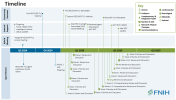Dakota15
Senior Member (Voting Rights)
4/24/25, UAB Pathology: '"The Path to Understanding Long COVID" By Nathan Erdmann, M.D., Ph.D.
Erdmann: "In the field, but particularly in the media, there's been a lot of trash talk about RECOVER lighting money on fire and not delivering the goods, which I get because you have thousands of patients that are miserable and frustrated and aren't getting treatments - and yet it is a prospective study for a very, very complicated disease and the way perspective studies work, is you put a lot of front end in it and then it starts manifesting later. I get why that is not warmly received, but it is kind of a function of the agreement that we had in the beginning. There are things coming out of this and again we have a really cool trajectory paper that New England Journal actually gave favorable reviews to but then squashed, but it's going to find a home very soon and we'll be able to tell you about what the trajectory looks like of long COVID symptoms in RECOVER. i'm writing and need to be submitting soon, a paper on what happens for people that do and don't have long COVID with their symptoms when they get reinfected.”
Erdmann: "In the field, but particularly in the media, there's been a lot of trash talk about RECOVER lighting money on fire and not delivering the goods, which I get because you have thousands of patients that are miserable and frustrated and aren't getting treatments - and yet it is a prospective study for a very, very complicated disease and the way perspective studies work, is you put a lot of front end in it and then it starts manifesting later. I get why that is not warmly received, but it is kind of a function of the agreement that we had in the beginning. There are things coming out of this and again we have a really cool trajectory paper that New England Journal actually gave favorable reviews to but then squashed, but it's going to find a home very soon and we'll be able to tell you about what the trajectory looks like of long COVID symptoms in RECOVER. i'm writing and need to be submitting soon, a paper on what happens for people that do and don't have long COVID with their symptoms when they get reinfected.”
Last edited:

